《大学英语》课程PPT教学课件(英美文化基础)English_History
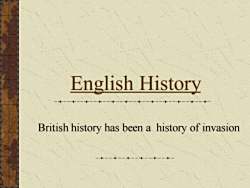
EnglishHistoryBritish history has been a history of invasion
English History British history has been a history of invasion
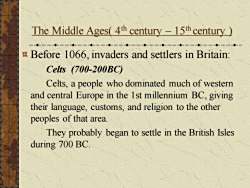
The Middle Ages(4th century -15th century) Before 1066. invaders and settlers in BritainCelts(700-200BC)Celts, a people who dominated much of westernand central Europe in the 1st millennium BC, givingtheir language, customs, and religion to the otherpeoples of that area.They probably began to settle in the British Islesduring700BC
The Middle Ages( 4th century – 15th century ) Before 1066, invaders and settlers in Britain: Celts (700-200BC) Celts, a people who dominated much of western and central Europe in the 1st millennium BC, giving their language, customs, and religion to the other peoples of that area. They probably began to settle in the British Isles during 700 BC
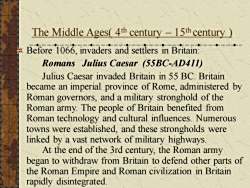
TheMiddleAges(4th century-15thcentury)Before i066,invaders and settiers in Britain:Romans Julius Caesar (55BC-AD411)Julius Caesar invaded Britain in 55 BC. Britainbecame an imperial province of Rome, administered byRoman governors, and a military stronghold of theRoman army. The people of Britain benefited fromRoman technology and cultural influences. Numeroustowns were established, and these strongholds werelinked by a vast network of military highways.At the end of the 3rd century, the Roman armybegan to withdraw from Britain to defend other parts ofthe Roman Empire and Roman civilization in Britainrapidlydisintegrated
The Middle Ages( 4th century – 15th century ) Before 1066, invaders and settlers in Britain: Romans Julius Caesar (55BC-AD411) Julius Caesar invaded Britain in 55 BC. Britain became an imperial province of Rome, administered by Roman governors, and a military stronghold of the Roman army. The people of Britain benefited from Roman technology and cultural influences. Numerous towns were established, and these strongholds were linked by a vast network of military highways. At the end of the 3rd century, the Roman army began to withdraw from Britain to defend other parts of the Roman Empire and Roman civilization in Britain rapidly disintegrated
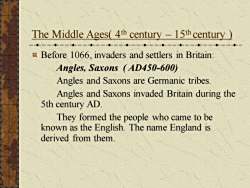
TheMiddleAges(4th century-15thcentury)* Before 1066. invaders and settlers in BritainAngles, Saxons (AD450-600)Angles and Saxons are Germanic tribesAngles and Saxons invaded Britain during the5thcenturyADThey formed the people who came to beknown as the English. The name England isderived from them
The Middle Ages( 4th century – 15th century ) Before 1066, invaders and settlers in Britain: Angles, Saxons ( AD450-600) Angles and Saxons are Germanic tribes. Angles and Saxons invaded Britain during the 5th century AD. They formed the people who came to be known as the English. The name England is derived from them
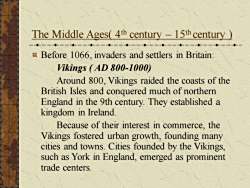
TheMiddleAges(4th century-15thcentury)* Before 1066. invaders and settlers in BritainVikings(AD800-1000)Around 800, Vikings raided the coasts of theBritish Isles and conguered much of northernEngland in the 9th century. They established akingdom in Ireland.Because of their interest in commerce, theVikings fostered urban growth, founding manycities and towns. Cities founded by the Vikingssuch as York in England, emerged as prominenttrade centers
The Middle Ages( 4th century – 15th century ) Before 1066, invaders and settlers in Britain: Vikings ( AD 800-1000) Around 800, Vikings raided the coasts of the British Isles and conquered much of northern England in the 9th century. They established a kingdom in Ireland. Because of their interest in commerce, the Vikings fostered urban growth, founding many cities and towns. Cities founded by the Vikings, such as York in England, emerged as prominent trade centers
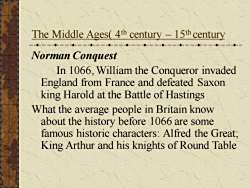
The MiddleAges(4th century-15th centuryNorman ConguestIn 1066, William the Congueror invadedEngland from France and defeated Saxonking Harold at the Battle of HastingsWhat the average people in Britain knowabout the history before 1066 are somefamous historic characters: Alfred the Great:King Arthur and his knights of Round Table
The Middle Ages( 4th century – 15th century Norman Conquest In 1066, William the Conqueror invaded England from France and defeated Saxon king Harold at the Battle of Hastings What the average people in Britain know about the history before 1066 are some famous historic characters: Alfred the Great; King Arthur and his knights of Round Table
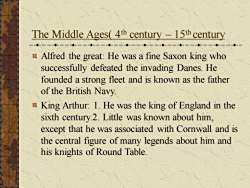
TheMiddleAges(4thcentury-15thcentury* Alfred the great: He was a fine Saxon king whcsuccessfully defeated the invading Danes. Hefounded a strong fleet and is known as the fatherof the British Navy* King Arthur: 1. He was the king of England in thesixth century.2. Little was known about him.except that he was associated with Cornwall and isthe central figure of many legends about him andhis knights of Round Table
The Middle Ages( 4th century – 15th century Alfred the great: He was a fine Saxon king who successfully defeated the invading Danes. He founded a strong fleet and is known as the father of the British Navy. King Arthur: 1. He was the king of England in the sixth century.2. Little was known about him, except that he was associated with Cornwall and is the central figure of many legends about him and his knights of Round Table
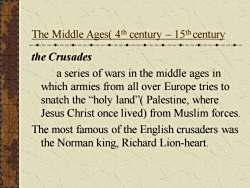
The MiddleAges(4th century-15th centurythe Crusadesa series of wars in the middle ages inwhich armies from all over Europe tries tosnatch the “holy land""( Palestine, whereJesus Christ once lived) from Muslim forcesThe most famous of the English crusaders wasthe Norman king, Richard Lion-heart
The Middle Ages( 4th century – 15th century the Crusades a series of wars in the middle ages in which armies from all over Europe tries to snatch the “holy land”( Palestine, where Jesus Christ once lived) from Muslim forces. The most famous of the English crusaders was the Norman king, Richard Lion-heart
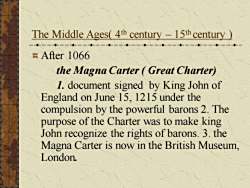
TheMiddleAges(4th century-15thcentury)* After 1066the Magna Carter (Great Charter)1. document signed by King John ofEngland on June 15, 1215 under thecompulsion by the powerful barons 2. Thepurpose of the Charter was to make kingJohn recognize the rights of barons. 3. theMagna Carter is now in the British Museum.London
The Middle Ages( 4th century – 15th century ) After 1066 the Magna Carter ( Great Charter) 1. document signed by King John of England on June 15, 1215 under the compulsion by the powerful barons 2. The purpose of the Charter was to make king John recognize the rights of barons. 3. the Magna Carter is now in the British Museum, London
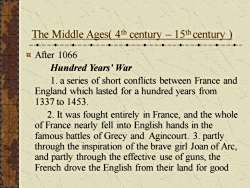
TheMiddleAges(4th century-15thcentury)张 After 1066Hundred Years'War1. a series of short conflicts between France andEngland which lasted for a hundred years from1337 to 14532. It was fought entirely in France, and the wholeof France nearly fell into English hands in thefamous battles of Grecy and Agincourt. 3. partlythrough the inspiration of the brave girl Joan of Arc.and partly through the effective use of guns, theFrench drove the English from their land for good
The Middle Ages( 4th century – 15th century ) After 1066 Hundred Years’ War 1. a series of short conflicts between France and England which lasted for a hundred years from 1337 to 1453. 2. It was fought entirely in France, and the whole of France nearly fell into English hands in the famous battles of Grecy and Agincourt. 3. partly through the inspiration of the brave girl Joan of Arc, and partly through the effective use of guns, the French drove the English from their land for good
按次数下载不扣除下载券;
注册用户24小时内重复下载只扣除一次;
顺序:VIP每日次数-->可用次数-->下载券;
- 《大学英语》课程PPT教学课件(英美文化基础)American literature(2).ppt
- 《大学英语》课程PPT教学课件(英美文化基础)American education.ppt
- 《大学英语》课程PPT教学课件(英美文化基础)4.British literature.ppt
- 《大学英语》课程PPT教学课件(英美文化基础)4.British Government System(2).ppt
- 《大学英语》课程PPT教学课件(英美文化基础)3. The Forms of Government.ppt
- 《大学英语》课程PPT教学课件(英美文化基础)2.American_History.ppt
- 《大学英语》课程PPT教学课件(英美文化基础)1.Atlantic_to_Pacific.ppt
- 《大学英语》课程PPT教学课件(英语国家概况)The U.S.ppt
- 《大学英语》课程PPT教学课件(英语国家概况)the Great Britain.ppt
- 《大学英语》课程PPT教学课件(英语国家概况)New Zealand.ppt
- 《大学英语》课程PPT教学课件(英语国家概况)Ireland.ppt
- 《大学英语》课程PPT教学课件(英语国家概况)Canada.ppt
- 《大学英语》课程PPT教学课件(英语国家概况)Australia.ppt
- 《大学英语》课程PPT教学课件(英语国家概况)American Holidays.ppt
- 《大学英语》课程PPT教学课件(翻译)第5-6周 词类转换和增译法.ppt
- 《大学英语》课程PPT教学课件(翻译)第十周课件.ppt
- 《大学英语》课程PPT教学课件(翻译)第八章 重译法.ppt
- 《大学英语》课程PPT教学课件(翻译)第九周课件.ppt
- 《大学英语》课程PPT教学课件(翻译)第12周 倒置法.ppt
- 《大学英语》课程PPT教学课件(翻译)第11周 语态变换法.ppt
- 《大学英语》课程PPT教学课件(英美文化基础)general_plan_for_this_semester.ppt
- 《大学英语》课程PPT教学课件(英美文化基础)英国教育.ppt
- 《商务英语视听说》课程教学资源(授课教案)Unit 1 Job interviews.docx
- 《商务英语视听说》课程教学资源(授课教案)Unit 2 Job and responsibilities.doc
- 《商务英语视听说》课程教学资源(授课教案)Unit 3 On the phone.doc
- 《商务英语视听说》课程教学资源(授课教案)Unit 4 At a meeting.doc
- 《商务英语翻译》课程教学大纲 Business English Translation.pdf
- 《商务英语翻译》课程授课教案(2016-2017-2).doc
- 《商务英语翻译》课程授课教案(2017-2018-1).doc
- 《商务英语翻译》课程授课教案(2016-2017-1).doc
- 《商务英语翻译》课程授课教案(汉译英).pdf
- 《商务英语翻译》课程授课教案(英译汉).pdf
- 《商务英语翻译》课程教学课件(讲稿)商务合同的英语翻译.pdf
- 《商务英语翻译》课程教学课件(讲稿)商务广告的翻译.pdf
- 《商务英语翻译》课程教学课件(讲稿)企业商号的翻译.pdf
- 《商务英语翻译》课程教学课件(讲稿)商务信函的翻译.pdf
- 《商务英语翻译》课程教学课件(讲稿)商务翻译(句法部分).pdf
- 《商务英语翻译》课程教学课件(讲稿)商务名片翻译 Business Cards.pdf
- 《商务英语翻译》课程教学课件(讲稿)商务翻译(词汇部分).pdf
- 《生态学》课程教学资源(文献资料)中国植物区系中的特有性及其起源和分化.pdf
